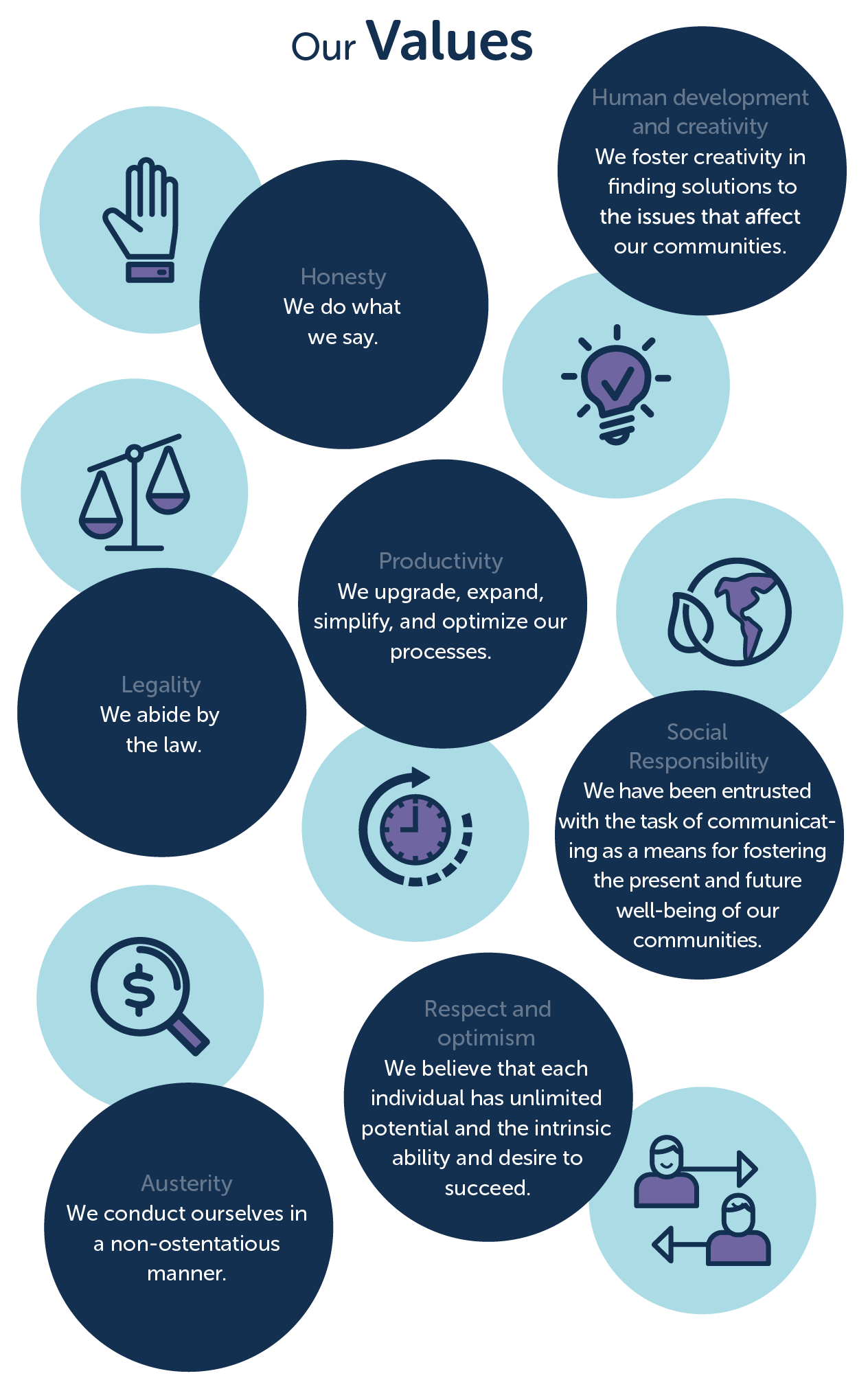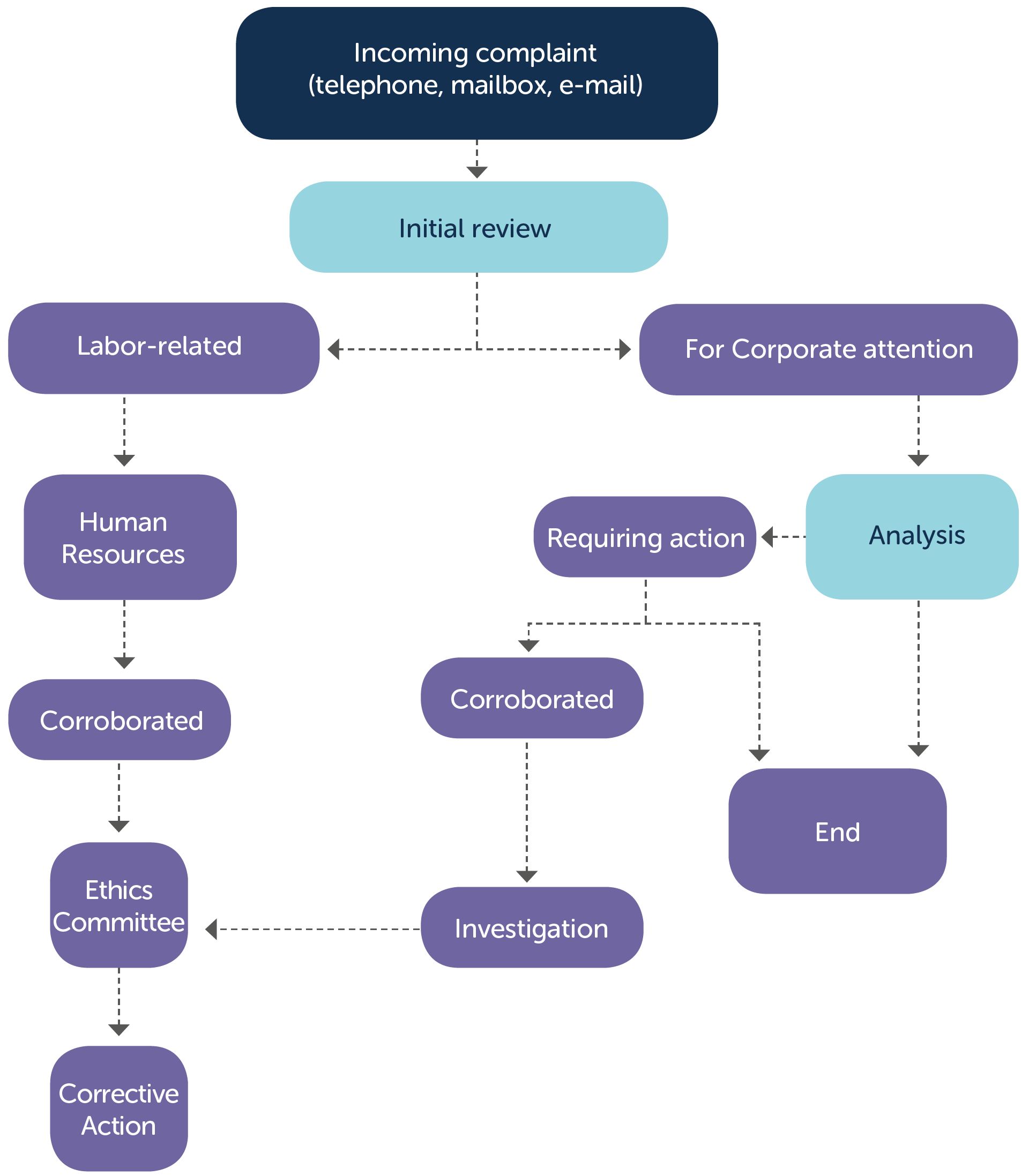| Profile | Service Excellence | Employees | Environmental Performance | Corporate Governance | ||

Corporate Governance
We believe that the successful transformation of our operations is contingent upon the soundness of our governance practices, this is why we are working on the implementation of internal policies and the incorporation of provisions in our contracts with our suppliers towards a more sustainable management.

Our shares are registered in Mexico, the United States, and Spain.
G4-3, G4-7, G4-17
América Móvil, S.A.B. de C.V. is a sociedad anónima bursátil de capital variable organized under the laws of Mexico. Our shares are currently listed for trading in Mexico, on the Mexican Stock Exchange (BMV:AMX); in the United States, on the New York Stock Exchange (NYSE: AMX); and in Spain, on the Mercado de Valores Latinoamericanos in Euros (LATIBEX:XAMXL).
According to beneficial ownership reports filed with the United States Securities and Exchange Commission (SEC), as of December 31, 2016, our ownership structure was as follows:
| América Móvil ownership structure | ||
| Shareholder | Number of shares (millions) | Percent of class(1) |
| AA Shares | ||
| Family Trust(2) | 10,894 | 52.8% |
| Inversora Carso(3) | 4,381 | 21.2% |
| Carlos Slim Helú | 1,879 | 9.1% |
| L Shares | ||
| Inversora Carso(3) | 6,020 | 13.5% |
| Family Trust(2) | 5,998 | 13.5% |
| Carlos Slim Helú | 3,072 | 6.9% |
| (1) | Percentage figures are based on the number of shares outstanding as of December 31, 2016. |
| (2) | The Family Trust holds AA Shares and L Shares for the benefit of members of the Slim family. In addition to shares held by the Family Trust, members of the Slim Family, including Carlos Slim Helú, directly own an aggregate of 3,558 million AA Shares and 9,570 million L Shares representing 17.2% and 21.5%, respectively, of each series. According to beneficial ownership reports filed with the SEC, none of these members of the Slim Family, other than Carlos Slim Helú, individually directly own more than 5.0% of any class of our shares. |
| (3) | Formerly known as Inmobiliaria Carso. Includes shares owned by subsidiaries of Inversora Carso. Based on beneficial ownership reports filed with the SEC, Inversora Carso may be deemed to be controlled by the Slim Family. |
For a detailed list of our subsidiaries, their jurisdictions, and our ownership interests, see our 2016 Annual Report on Form 20-F.
G4-34, G4-36, G4-38, G4-39, G4-40, G4-41, G4-42, G4-43, G4-44, G4-51, G4-52
We are transforming our operations by adhering to the best governance practices, which serve as a benchmark for our shareholders' and our Board of Directors' decision-making processes.
We conduct ourselves and our operations in an ethical, honest and transparent manner, consistent with our corporate mission, vision, values, and philosophy. In addition, we abide by the governance provisions contained in:
1 Available at: http://www.americamovil.com/sites/default/files/2016-08/bylaws.pdf
2 Available at: http://www.americamovil.com/sites/default/files/2016-09/Corporate_Governance_Policies_and_Code_of_Ethics_English.pdf
3 Available at: http://www.americamovil.com/sites/default/files/2016-08/politicas.pdf
To ensure the maintenance of adequate decision-making processes, and of the course of our organization, we are required to call a Shareholders' Meeting —which is our highest governance body— within the first four months of each year, to elect or re-elect the members and/or alternate members of our Board of Directors for one-year terms, determine their compensations4 and the compensations of the members of the Board of Directors' ancillary committees for attending the meetings thereof, and address other matters.
Our Shareholders' Meeting provides follow-up in connection with the decisions of our Board of Directors, which is comprised of 14 directors nominated by the holders of our Series AA and Series A shares, voting together, and two directors nominated by the holders of our Series L shares. Carlos Slim Domit and Patrick Slim Domit, neither of whom is a member of our senior management, serve as the Chairman and Vice Chairman of our Board of Directors.
4 The aggregate compensation paid to our directors (including compensation paid to members of our Audit and Corporate Practices Committee) and senior management in 2016 was approximately $4 million pesos and $64 million pesos, respectively.

We have identified
risks at 100% of
our facilities.
In connection with its decision-making process, our Board of Directors receives support from our Internal Audit Department and from two committees:
Our Internal Audit Department is primarily responsible for performing three types of audits: Risk Management Audits, which focus on various operating processes, and on the integrity of our operations; SOX Audits, which seek to ascertain our compliance with the financial information accuracy and disclosure requirements set forth in the Sarbanes-Oxley Act; and Special Audits, which focus on specific processes or activities.
The actions taken by our Board of Directors and its committees, and the annual reports of activities of such governance bodies for any given year, are subject to ongoing review by our Shareholders' Meeting and must comply with the securities laws and regulations of Mexico, which is our jurisdiction of incorporation.
Given our aim to attain sustainability through the transformation of our operations, and the size of our organization, all material decisions concerning economic, social and environmental topics are taken by our senior management at Corporate Level. These topics are reviewed and validated by our General Counsel, who reports to our Chief Executive Officer. In 2016, we began establishing sustainability committees at each of our subsidiaries, which are responsible for addressing and providing follow-up in connection with sustainability-related matters under the direction of local management.
In addition, throughout the past year we continued to work on the development of our sustainability strategy and of the policies from which it stems, as a basis for changing the way in which we approach the subject internally and with our stakeholders.

For detailed information concerning the risks that we have identified, see our Annual Report under Form 20-F, which is available at:
http://www.americamovil.com/sites/default/files/2017-04/reporte-annual-2016.pdf
G4-2, G4-14, G4-45, G4-46, G4-47, G4-SO3
Any corporate sustainability strategy must seek to anticipate the potential risks to which the company is exposed. Accordingly, we have identified the risks relating to our activities and goals at 100% of our facilities, including those associated with macroeconomic, social or market conditions, changes in regulation, and corruption, and have taken mitigation actions through internal and external mechanisms such as the review of our senior management and risk management, ethics, and security committees for performance, internal audits at both the parent company and local levels, and external audits.
Our Internal Audit Department identifies the aspects of our subsidiaries' operations that carry the risk of fraud in order to incorporate their review and assessment into the relevant subsidiaries' annual auditing plan, monitor such risks, and ensure that they do not interfere with the achievement of our goals.
We classify fraud into three large categories:
1) Corruption.
2) Improper use of our assets.
3) Inaccurate or false information.
5 Corruption: The abuse of one's influence or position to obtain a benefit for one's own self or for others to the detriment of our organization. It includes conflicts of interest, unlawful payments or other compensation, bribery, and extortion.
We have also identified the risks that could have a direct impact on our sustainability. These include:
G4-50, G4-56, G4-57, G4-58, G4-HR2, G4-HR3, G4-HR4, G4-HR5, G4-HR6, G4-HR7, G4-HR9, G4-HR12, G4-SO4, G4-SO5, G4-SO11
The manner in which we conduct ourselves and our operations, make our business decisions, and interact with our stakeholders in each of the countries in which we operate, is reflective of the values, principles and philosophy that have characterized our company over the years.
We understand that in seeking to evolve continuously in order to adapt to global conditions and to changes in our industry, we must stick to our core values and principles, and comply with stringent internal policies to ensure that all of our operations are conducted in an ethical manner, comply with the law, and protect human rights.
Given the materiality of these aspects, in 2016 we undertook a thorough revision of our Code of Ethics, which addresses topics such as the privacy of information, human rights, and the environment, among others. Currently, we conduct all of our internal and external activities in accordance with the guidelines contained in our Corporate Governance Policies and our Code of Ethics6.

We undertook to
revise and update
our Code of Ethics.
We have established several channels through which our employees and stakeholders can contact us to report —on a confidential basis— conducts, attitudes, or acts which are unlawful, inappropriate, or contrary to our corporate values and philosophy:


Our Values
1) Our stakeholders can report these occurrences via e-mail to lineadedenuncia@americamovil.com
2) Our employees can approach their respective supervisors.
3) All can call our subsidiaries' hotlines.
We are in the process of developing a centralized whistleblowing portal that we plan to launch in 2017, which will make it possible to report any instance of corruption not only confidentially but also anonymously, if desired.
All complaints of corruption at our subsidiaries' level are forwarded to our Internal Audit Department for review and consultation with our Legal Department and other relevant areas. Upon corroboration of the complaint, the case is turned over to the relevant subsidiary's ethics committee —that is comprised of the heads of our local legal, audit, fraud and human resources departments— for determination of the applicable internal, administrative, or legal penalties. In addition, we have established a mirror committee at Corporate level, to address complaints of misconduct by our senior management.
Substantiated complaints are investigated by the relevant subsidiary through the internal oversight body designated by us to such effect, which may convey the allegations to our Board of Directors' Audit and Corporate Practices Committee.
We seek to ensure that all of our suppliers comply with the provisions contained in our Code of Ethics, and with all of our policies. In 2016, we incorporated new provisions in the procurement contracts that were due for renewal, in order to strengthen our commitment to sustainability across our entire value chain. As of the end of 2016, 91% of our procurement contracts contained provisions designed to ensure the lawful provenance of all of our raw materials, as well as the protection of human rights and the environment.
Any supplier who is found to have incurred in misconduct is blacklisted and precluded from rendering any future service to any of our subsidiaries.
As a measure for preventing the occurrence of instances of fraud or corruption, and/or the violation of our Code of Ethics, we retrain our employees annually on the enforcement of our policies and procedures. In 2016, we provided an aggregate of 1,780 hours of training to our employees, including refresher courses to 25 thousand employees in all of the countries in which we operate, and formal induction courses to an additional 2,852 employees.
Notwithstanding these efforts, in 2016 we received and addressed more than 500 comments.
We and our subsidiaries respect the human rights of all the individuals with whom we come into contact, whether it be our employees, distributors, customers, investors, or shareholders, or others. For instance, all of our employees, regardless of their jurisdiction of employment, are at liberty to engage in collective bargaining.

In addition, our recruitment practices, employment contracts, and human resources policies are designed to ensure that all of our operations are free from forced or compulsory labor, and child labor.
We are also engaged in material efforts to foster awareness and encourage the adoption and observance of the same practices by our suppliers. For example, in Colombia and Ecuador, we provided formal training on human rights issues to 95% and 65%, respectively, of our security companies' staff.
Internally, in Colombia and Puerto Rico, we provided an average of 4 hours and 2.5 hours of training on human rights issues per employee, respectively, to an aggregate of 802 employees. In addition, we conducted performance reviews at each of our Colombian facilities.